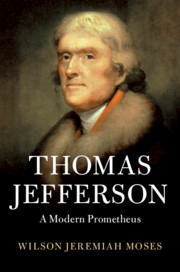Book contents
- Thomas Jefferson
- Cambridge Studies on the American South
- Frontispiece
- Thomas Jefferson
- Copyright page
- Dedication
- Contents
- Preface
- Acknowledgments
- Note on Methods and Bibliography
- 1 Introduction
- 2 Lincoln and Historiography
- 3 Let Our Workshops Remain at Monticello
- 4 Life, Liberty, Property, and Peace
- 5 What is Genius? “Openness, Brilliance, and Leadership”
- 6 A Renaissance Man in the Age of the Enlightenment
- 7 Baconism and Natural Science
- 8 Anthropology and Ethnic Cleansing: White “Rubbish,” Blacks, and Indians
- 9 Education, Religion, and Social Control
- 10 Women and the Count of Monticello
- 11 Debt, Deference, and Consumption
- 12 Defining the Presidency
- Index
9 - Education, Religion, and Social Control
Published online by Cambridge University Press: 01 April 2019
- Thomas Jefferson
- Cambridge Studies on the American South
- Frontispiece
- Thomas Jefferson
- Copyright page
- Dedication
- Contents
- Preface
- Acknowledgments
- Note on Methods and Bibliography
- 1 Introduction
- 2 Lincoln and Historiography
- 3 Let Our Workshops Remain at Monticello
- 4 Life, Liberty, Property, and Peace
- 5 What is Genius? “Openness, Brilliance, and Leadership”
- 6 A Renaissance Man in the Age of the Enlightenment
- 7 Baconism and Natural Science
- 8 Anthropology and Ethnic Cleansing: White “Rubbish,” Blacks, and Indians
- 9 Education, Religion, and Social Control
- 10 Women and the Count of Monticello
- 11 Debt, Deference, and Consumption
- 12 Defining the Presidency
- Index
Summary
Jefferson recorded a rumor in his Anas that the “old fox,” George Washington, when under clerical pressure “to declare publicly whether he was a Christian or not,” had evaded the issue. Jefferson recorded the rumor – “Dr. Rush tells me that he had it from Asa Green” – in his “private papers” for all future generations to read, along with his own comment, “the old fox was too cunning for them.” According to Jefferson and his informants, Washington’s public statements contained no affirmations of Jesus’ divinity, only vague references to “the benign influence of the Christian religion.” Jefferson invoked the additional testimony of Gouverneur Morris, “who pretended to be in his secrets & believed himself to be so, has often told me that Genl. Washington believed no more of that system than he himself did.” Jefferson, who questioned Washington’s acuteness when convenient in the Anas, portrayed him here as at least clever enough to share Jefferson’s own heterodoxy.
- Type
- Chapter
- Information
- Thomas JeffersonA Modern Prometheus, pp. 312 - 363Publisher: Cambridge University PressPrint publication year: 2019

